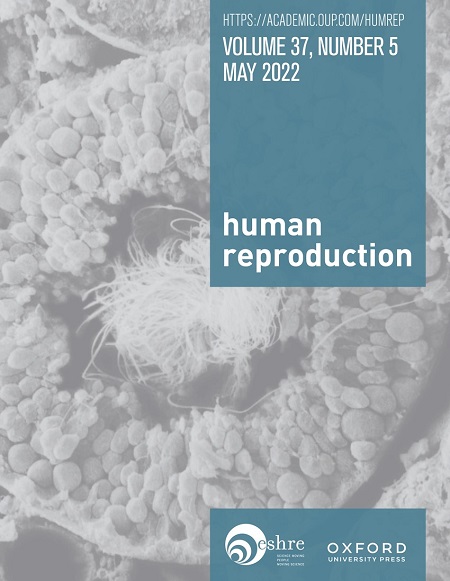O-130 Dysregulated Epigenetic Reprogramming during Pre-Implantation Development of Embryos from Patients with Polycystic Ovary Syndrome
IF 6.1
1区 医学
Q1 OBSTETRICS & GYNECOLOGY
引用次数: 0
Abstract
Study question How Abnormal Epigenetic Reprogramming Prior to Embryo Implantation Contributes to the Onset and Intergenerational Inheritance of Polycystic Ovary Syndrome (PCOS)? Summary answer PCOS embryos exhibit dysregulated epigenetic reprogramming, including H3K4me3, H3K27me3, H3K9me3, and DNA methylation, which are associated with abnormal gene expression and inherited anomalies from oocytes. What is known already PCOS is a leading cause of infertility, with familial aggregation and unclear intergenerational inheritance mechanisms. Abnormal epigenetic regulation in early embryonic development has been linked to disease inheritance. Study design, size, duration This was a comparative study analyzing the transcriptome and epigenome of oocytes and preimplantation embryos collected from 133 PCOS patients and 95 non-PCOS infertile women. Participants/materials, setting, methods Oocytes and embryos from PCOS and non-PCOS infertile women were analyzed using ultra-low-input sequencing techniques, including Smart-seq2, CUT&RUN, and WGBS, to identify transcriptomic and epigenomic abnormalities. Main results and the role of chance PCOS embryos demonstrated significant dysregulation of zygotic genome activation genes, epigenetic regulators, PCOS-linked genes, and retrotransposons during preimplantation development. These anomalies were linked to abnormal epigenetic reprogramming, particularly in histone modifications (H3K4me3, H3K27me3, H3K9me3) and DNA methylation, with a substantial portion inherited from PCOS oocytes. Treatment with PRC2 complex inhibitors effectively rescued abnormal gene expression, indicating a critical role of these epigenetic modifications in driving the observed abnormalities. Key regulatory factors associated with these epigenetic disruptions were identified. Statistical analyses confirmed the robustness of the findings, minimizing the role of chance. Limitations, reasons for caution The study’s findings are based on in vitro analyses of oocytes and preimplantation embryos, which may not fully capture in vivo processes. Further research is needed to validate the long-term effects of these epigenetic abnormalities on post-implantation development and the health of offspring. Wider implications of the findings This study highlights a direct link between aberrant epigenetic reprogramming in early embryos and the intergenerational inheritance of PCOS. These findings provide a foundation for developing targeted therapeutic interventions and risk assessment strategies for PCOS in offspring, offering new avenues for prevention and treatment. Trial registration number No多囊卵巢综合征患者胚胎着床前发育过程中O-130异常的表观遗传重编程
胚胎着床前异常表观遗传重编程如何影响多囊卵巢综合征(PCOS)的发病和代际遗传?PCOS胚胎表现出异常的表观遗传重编程,包括H3K4me3、H3K27me3、H3K9me3和DNA甲基化,这与卵母细胞基因表达异常和遗传异常有关。已知多囊卵巢综合征是不育的主要原因,具有家族聚集性和不明确的代际遗传机制。胚胎早期发育异常的表观遗传调控与疾病遗传有关。这是一项比较研究,分析了133名PCOS患者和95名非PCOS不育妇女的卵母细胞和着床前胚胎的转录组和表观基因组。采用超低输入测序技术(包括Smart-seq2、CUT&;RUN和WGBS)对PCOS和非PCOS不育妇女的卵母细胞和胚胎进行分析,以确定转录组和表观基因组异常。PCOS胚胎的主要研究结果和作用表明,在胚胎着床前发育过程中,合子基因组激活基因、表观遗传调节因子、PCOS相关基因和反转录转座子的调控显著失调。这些异常与异常的表观遗传重编程有关,特别是组蛋白修饰(H3K4me3, H3K27me3, H3K9me3)和DNA甲基化,其中很大一部分遗传自PCOS卵母细胞。PRC2复合物抑制剂治疗有效地挽救了异常基因表达,表明这些表观遗传修饰在驱动观察到的异常中起着关键作用。确定了与这些表观遗传破坏相关的关键调控因子。统计分析证实了研究结果的稳健性,将偶然性的影响降到最低。该研究的发现是基于卵母细胞和植入前胚胎的体外分析,可能不能完全捕获体内过程。需要进一步的研究来验证这些表观遗传异常对着床后发育和后代健康的长期影响。本研究强调了早期胚胎异常表观遗传重编程与多囊卵巢综合征代际遗传之间的直接联系。本研究结果为后代PCOS的针对性治疗干预和风险评估策略的制定提供了基础,为预防和治疗提供了新的途径。试验注册号
本文章由计算机程序翻译,如有差异,请以英文原文为准。
求助全文
约1分钟内获得全文
求助全文
来源期刊

Human reproduction
医学-妇产科学
CiteScore
10.90
自引率
6.60%
发文量
1369
审稿时长
1 months
期刊介绍:
Human Reproduction features full-length, peer-reviewed papers reporting original research, concise clinical case reports, as well as opinions and debates on topical issues.
Papers published cover the clinical science and medical aspects of reproductive physiology, pathology and endocrinology; including andrology, gonad function, gametogenesis, fertilization, embryo development, implantation, early pregnancy, genetics, genetic diagnosis, oncology, infectious disease, surgery, contraception, infertility treatment, psychology, ethics and social issues.
 求助内容:
求助内容: 应助结果提醒方式:
应助结果提醒方式:


